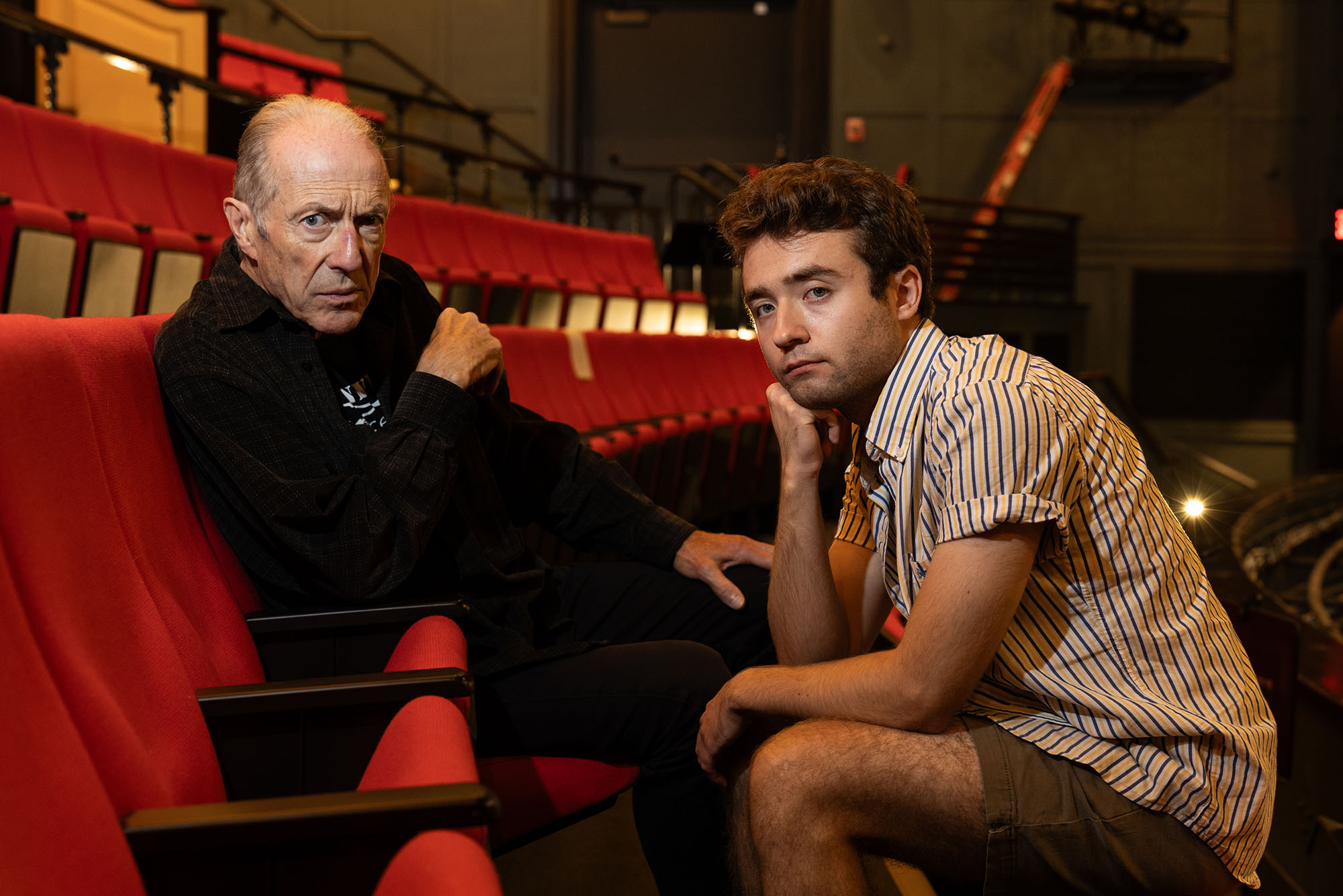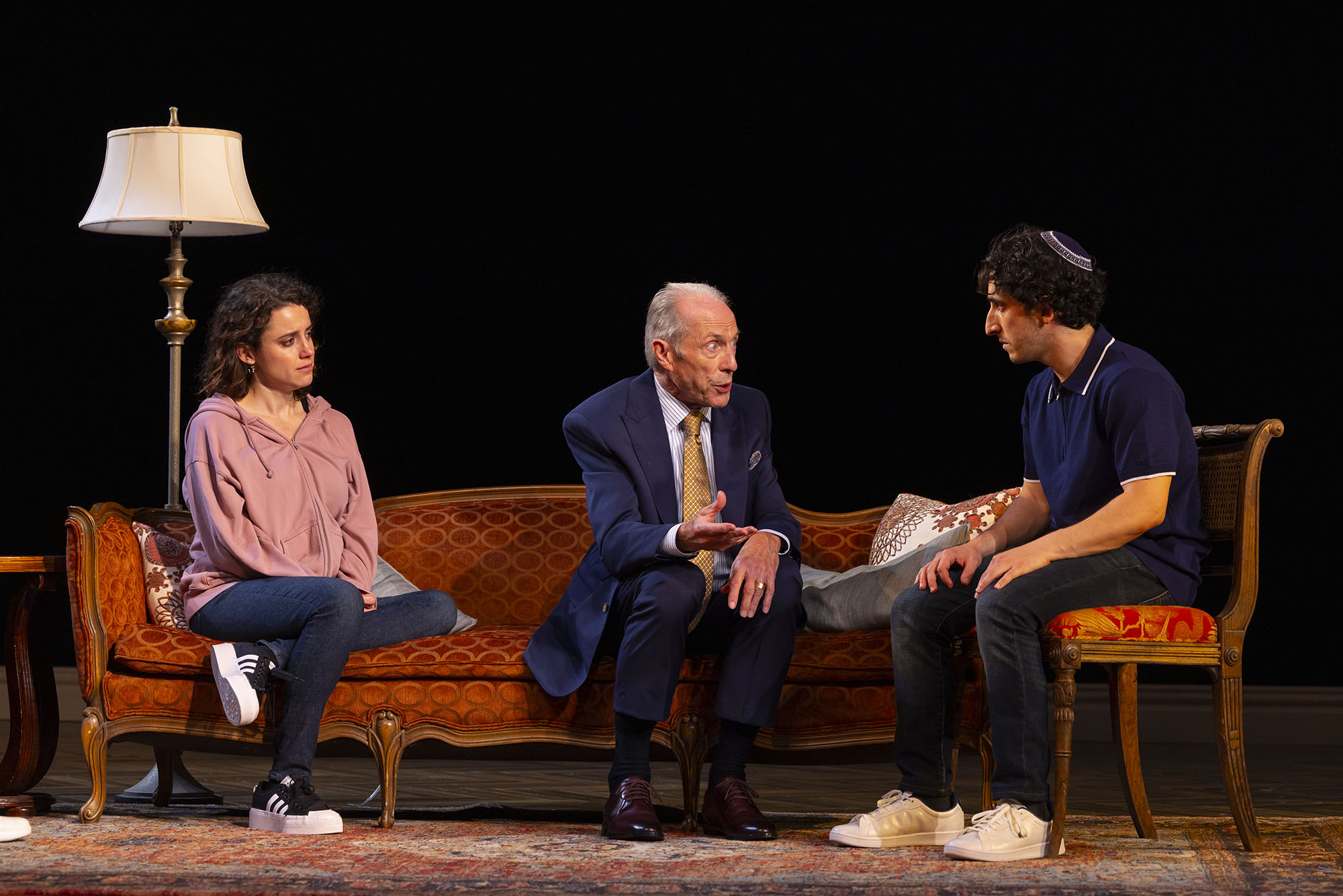In Huntington Theatre Company’s Prayer for the French Republic, BU Alum and Current Student Play Same Character, 70 Years Apart

Will Lyman (CFA’71) (left) and Jesse Kodama (CFA’25) portray the same character at different points in his life in the Huntington Theatre Company’s production of Prayer for the French Republic. Photo by Jake Belcher
In Huntington Theatre Company’s Prayer for the French Republic, BU Alum and Current Student Play Same Character, 70 Years Apart
Will Lyman (CFA’71) and Jesse Kodama (CFA’25) on play’s exploration of fear, hope, and family
Over the course of a five-decade and counting career, award-winning actor Will Lyman has played a range of characters, among them the title role in Shakespeare’s King Lear and James Tyrone in Eugene O’Neill’s Long Day’s Journey into Night. He’s also been the voice of the Dos Equis “Most Interesting Man in the World” advertising campaign. But he’s perhaps best known to audiences for his 40-year stint as narrator of the PBS Emmy Award–winning documentary series Frontline.
After a pandemic-induced pause, Lyman (CFA’71) has returned to the stage in the Huntington Theatre Company’s production of Prayer for the French Republic, running at the Huntington Theatre through October 8. Lyman, whose relationship with the Huntington goes back nearly 60 years, plays Pierre Salomon, the 85-year-old patriarch of a Jewish family living in Paris.
“It feels glorious to be back,” he says. “Working with this family was a great, great way to come back to back to work.”
Also appearing in the production is Jesse Kodama (CFA’25), a young actor taking his first steps in the professional theater world. Kodama portrays the same character 70 years earlier, at age 14. “I’m very lucky to be in a play that I feel rings true in a lot of different ways,” Kodama says. “It asks a lot of really powerful questions that there’s no real answers to.”
Prayer for the French Republic, which debuted at the Manhattan Theatre Club in 2022 and is set to open in a separate production on Broadway this winter, pits fate against faith in its depiction of a French Jewish family grappling with an uncertain future. Cutting back and forth in time between 1940 to 1946 and 2016, the play follows the multigenerational Salomons during two periods of extreme right-wing anti-Semitism in France. In 1945, World War II is over and 14-year-old Pierre and his father have just returned home from the immense tragedy of Auschwitz. Fast forward to 2016: after Pierre’s grandson, Daniel (Joshua Chessin-Yudin) is beaten for wearing a kippah—a small round cap traditionally worn by Jewish men—85-year-old Pierre sees his family grapple with whether they should remain in Paris or leave their homeland for Israel.

Like Harmon’s breakout play, Bad Jews, his most recent drama explores some age-old themes: persecution, Jewish identity, and the cost of assimilation.
“The best theater is about personal relationships and this play is personal before you have to think about whether you know somebody who [experienced] the Holocaust,” Lyman says. “It’s about people dealing with each other and dealing with their own fear and their hopes and dreams. It’s about people struggling to find their way.”
Prayer for the French Republic was selected by Huntington artistic director Loretta Greco as the first production of her debut season. Greco, who comes to Boston by way of San Francisco’s Magic Theatre and is directing the show, says it’s fitting that the production’s youngest cast member and its oldest should play the same role.
“Joshua has written a beautiful and insightful harmony at each end of the spectrum for this character,” she says, “and I would be hard-pressed to think of a more perfectly suited pair than Will and Jesse to inhabit Pierre.” In view of both actors’ portrayal of a Holocaust survivor, she directed the play not as a sob story or a spectacle of atrocities, but with Pierre as a fully-realized human being, not a faceless victim or a tally mark.
“Our director has been encouraging me to be present and [know] that I can’t play the past, only this moment, which has been the hardest part for me,” Kodama says. “This play is about people moving forward and putting one foot in front of the other, which I find so miraculous.”
This is Kodama’s first production with a professional theater company. During the show’s previews, he missed the first week of his College of Fine Arts classes, but now that performances are in full swing, he attends classes during the day and arrives at the Huntington for call time.
“Working on this play has been the best acting education I’ve gotten,” he says. “I’ve learned so much from everyone. When I watched Will for the first time at the table read, he just held his own space and has such a presence, which is awesome to watch.”

Lyman and Kodama aren’t the only Terriers with ties to the production: Talia Sulla (CFA’23) plays the Salomon family’s American cousin Molly, joined by Tony Award–winning lighting designer Christopher Akerlind (CFA’85); Understudies Zach Kelley (CFA’22) and Fady Demian (CFA’23) round out the production’s BU representation.
Lyman, recalling his own formative years in the theater (his first role at the Huntington was as a member of the stage crew for a 1966 production of Richard III) has some hard-won advice for Kodama. “A lot of graduates are just anxious to pop off to New York, but people who stay in Boston find that they can actually work,” he says. “It’s a great place for a young actor who just wants to work and wants to get experience and wants to learn his craft.”
Both actors say that the play’s themes—of uncertainty in the face of a changing world, of the unity and fissures created by religion—are universal, and all too relevant.
Prayer for the French Republic “talks a lot about hate, about the danger that is posed by hatred in society—it seems to me that hate has been given a whole new lease on life,” Lyman says.
But the drama also reveals the myriad ways individuals respond to hate. Each member of the extended Salomon family, from great-great-grandmother to great-great-grandson and those in between, is forced to decide what perseverance looks like: Should we be bold or cautious? Do we splinter apart or close ranks? Do we run or do we fight?
“In this play you see a lot of different perspectives on hate that are all very valid and very human,” Kodama says. “What’s really powerful is that this play explores a lot of people who choose to respond with love and not out of fear, which isn’t easy.”

Comments & Discussion
Boston University moderates comments to facilitate an informed, substantive, civil conversation. Abusive, profane, self-promotional, misleading, incoherent or off-topic comments will be rejected. Moderators are staffed during regular business hours (EST) and can only accept comments written in English. Statistics or facts must include a citation or a link to the citation.